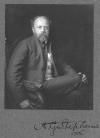Alfred George Stephens poet from Australia was born on August 28, 1865, had 67 years and died on April 15, 1933. Poems were written mainly in English language. Dominant movement is other.
Biography
lfred George Stephens was an Australian writer and literary critic, notably for The Bulletin. He was appointed to that position by its owner, J. F. Archibald in 1894.
Life
Alfred George Stephens was born in Toowoomba, Queensland on August 28th, 1865. He attended Toowoomba Grammar School until the age of 15 when he went to Sydney to learn the printing trade. While there he also gained certificates in French and German from Sydney Technical College. Returning to Queensland in 1889 he became the editor of country newspapers at Gympie and Cairns and sub-editor of "The Boomerang" in Brisbane. During his stay in Cairns he won a prize for an essay titled Why North Queensland Wants Separation which was published as a pamphlet. It was here too that he met Constance Smith whom he was later to marry.
In 1893 he visited the World's Fair at Chicago as correspondent for a number of Australian newspapers. He travelled in Canada and Europe before settling as a journalist in London on the Daily Chronicle. In response to an offer from J.F. Archibald he returned to Australia in 1894 to commence work on "The Bulletin" as a general writer and sub-editor of verses and stories. In the same year an account of his experiences abroad was published as A Queenslander's Travel Notes.
In 1896 he instituted, and became editor of, The Bulletin's famous literary section "The Red Page". This was to be a major force in fostering an appreciation of literature among a generation of Australians. He was also placed in charge of the book publishing department and between 1897 and 1905 he selected and edited 23 works including Such Is Life by Tom Collins, Steele Rudd's On Our Selection and the poems of Will Ogilvie, Louise Mack, Roderic Quinn and Bernard O'Dowd. It has been rightly said that "most of them owed their existence, as authors, to Stephen's discernment". During this period he also launched "The Bookfellow", a literary magazine of which 5 numbers appeared in 1899.
In 1906 he left "The Bulletin" to set up on his own as an independent literary agent, publisher and writer. He revived "The Bookfellow" as a weekly but when this venture failed because of insufficient capital, he accepted the position of assistant editor on the "Evening Post" in Wellington, New Zealand.
He returned to Sydney in 1909 and in 1911 he again revived "The Bookfellow", this time as a monthly magazine. It was suspended in 1916 while he edited the successful Anzac Memorial, a miscellany of art, prose and verse published by the Returned Soldiers Association, but was recommenced in 1919 and continued to appear at irregular intervals until 1925. It was during this period that he published a series of notable interviews with prominent people including J.C. Williamson, Gladys Moncrieff and Somerset Maugham. He also continued his policy of publishing small volumes of verse including three collections of John Shaw Neilson's poems.
Following the demise of "The Bookfellow" he continued as a freelance journalist, publisher and confidant of writers. Despite financial hardship he maintained his vision of a distinctly Australian literature which, while acknowledging its European origins, would nevertheless achieve an importance and value of its own. He died at Sydney on 15 April 1933. ..






